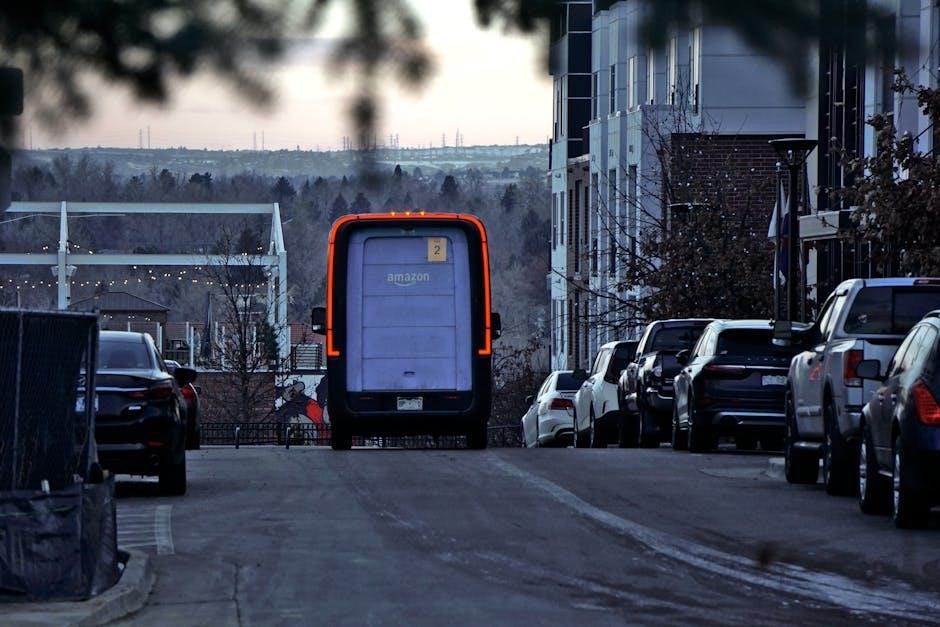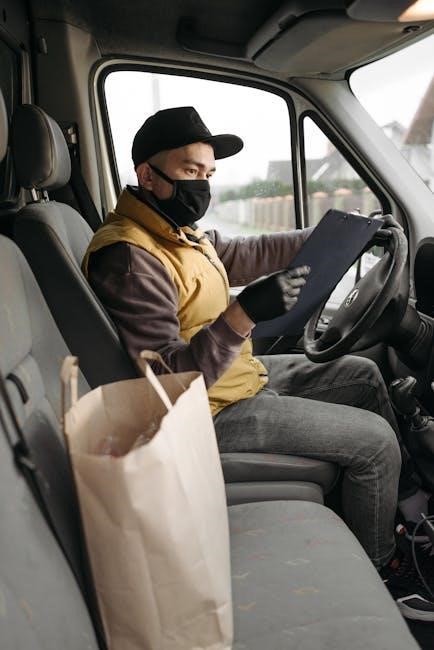The Colorado Commercial Driver License (CDL) Manual is a comprehensive guide designed to help commercial motor vehicle drivers understand state and federal regulations, safety protocols, and licensing requirements. It provides detailed information on traffic laws, vehicle inspection procedures, and best practices for operating commercial vehicles safely and efficiently. This manual is essential for anyone preparing for the CDL exam or seeking to maintain their commercial driving privileges in Colorado.
1.1 Purpose and Scope of the Manual
The Colorado Commercial Driver License Manual serves as a guide for CDL applicants, outlining state and federal regulations, safe driving practices, and legal requirements. It covers essential topics such as licensing classes, medical certifications, and traffic laws, ensuring drivers are well-informed and compliant with industry standards to operate commercial vehicles safely and responsibly.
1.2 Importance of the CDL Manual for Commercial Drivers
The Colorado CDL Manual is a primary resource for commercial drivers, detailing regulations, safety protocols, and licensing processes. It ensures drivers understand state and federal laws, prepares them for exams, and promotes safe driving practices. Adherence to the manual is crucial for maintaining compliance, reducing risks, and operating commercial vehicles responsibly.

Eligibility Requirements for Obtaining a CDL in Colorado
To qualify for a CDL in Colorado, candidates must meet specific eligibility criteria, including age, residency, medical certification, and background checks, ensuring they are fit to operate commercial vehicles safely.
2.1 Age Requirements
In Colorado, applicants for a CDL must be at least 18 years old to drive intrastate (within the state) and 21 years old for interstate (across state lines) commercial driving. These age requirements ensure drivers have sufficient maturity and experience to operate commercial vehicles safely and responsibly.
2.2 Residency and Documentation
Applicants for a Colorado CDL must provide proof of residency and legal presence. Required documents include a valid Social Security card, Colorado ID, and two proofs of residency, such as utility bills or a lease agreement. Non-citizens must provide immigration documents. These requirements ensure eligibility and compliance with state and federal regulations.
2.3 Medical Certification
Commercial drivers in Colorado must meet federal medical standards. A medical certificate from an FMCSA-approved examiner is required. Drivers must pass a vision test and undergo a physical examination. The medical certification must be submitted to the Colorado DMV. Failure to maintain medical fitness can result in CDL suspension or disqualification.
2.4 Background Checks and Disqualifications
Applicants for a Colorado CDL must undergo a background check, particularly for HAZMAT endorsements. Certain criminal convictions, such as DUI or felony offenses, can disqualify individuals from obtaining or maintaining a CDL. The Colorado DMV evaluates these factors to ensure public safety. Disqualifications may be temporary or permanent, depending on the offense.

Classes of Commercial Driver Licenses
The Colorado CDL program offers three license classes: Class A, B, and C. Each class corresponds to specific vehicle types and weight requirements, ensuring drivers are qualified to operate their designated vehicles safely.
3.1 Class A, B, and C Licenses Explained
Class A licenses cover combination vehicles with a trailer, Class B for heavy straight trucks, and Class C for smaller passenger vehicles or hazardous materials transport. Each class is tailored to specific vehicle types and weight requirements, ensuring drivers are properly qualified to operate their designated vehicles safely and efficiently.
3.2 Endorsements and Restrictions
Endorsements are special designations added to a CDL, such as H (hazardous materials) or P (passenger), enabling drivers to operate specific vehicle types or transport certain goods. Restrictions, like E (no manual transmission) or L (no air brakes), limit driving privileges based on skill or vehicle type, ensuring safe and compliant operation.
Study Materials and Resources
The official Colorado CDL manual is the primary study resource, offering detailed information on regulations, safety practices, and exam preparation. Online study guides, practice tests, and driver education courses are also available to aid in mastering the material.
4.1 The Official Colorado CDL Manual
The official Colorado CDL manual is a comprehensive guide providing detailed information on state and federal regulations, safe driving practices, and licensing requirements. It covers topics such as vehicle inspection, traffic laws, and endorsements, serving as the primary study resource for commercial drivers preparing for exams or maintaining their credentials.
4.2 Online Study Guides and Practice Tests
Online study guides and practice tests are valuable tools for preparing for the Colorado CDL exam. These resources provide interactive learning experiences, sample questions, and detailed explanations to help drivers master the material. Many are available on the Colorado DMV website or through third-party platforms, offering flexible study options for aspiring commercial drivers.

The Application and Testing Process
The application and testing process for a Colorado CDL involves submitting required documents, passing a vision test, and completing written and skills tests. Applicants must apply in person at a Colorado DMV office, providing proof of residency, medical certification, and identity. The process ensures applicants meet all state and federal requirements for commercial driving.
5.1 Steps to Apply for a CDL
To apply for a CDL in Colorado, review the manual, gather required documents (proof of identity, residency, and medical certification), and choose your license class and endorsements. Visit a DMV office, complete the application, pay fees, pass a vision test, and take the written and skills tests to obtain your Commercial Learner’s Permit (CLP) before advancing to the full CDL.
5.2 Written and Skills Tests
Pass a written test covering traffic rules, safe driving practices, and specific knowledge for your CDL class. Study the Colorado CDL Manual thoroughly to prepare for these sections. The skills test includes a pre-trip inspection, basic vehicle control, and on-road driving assessment, demonstrating your ability to operate a commercial vehicle safely and competently.
5.3 Fees and Payment Methods
The Colorado CDL application process involves specific fees for commercial licenses, endorsements, and testing. Payments can be made using credit cards, cash, or checks at DMV offices. Ensure to verify the current fee schedule on the Colorado DMV website or contact them directly for accurate pricing and accepted payment methods before applying.
Safe Driving Practices and Regulations
This section outlines essential safe driving practices and regulations for commercial drivers in Colorado, focusing on fatigue management, cargo securement, and hazardous materials transport guidelines.
6.1 Hours of Service and Fatigue Management
This section focuses on FMCSA regulations governing drive time, rest periods, and work-hour limits to prevent driver fatigue. It outlines the 14-hour workday limit, 11-hour driving cap, and mandatory 30-minute breaks. Understanding these rules is critical for maintaining safety and compliance while operating commercial vehicles in Colorado.
6.2 Load Securement and Cargo Safety
Proper load securement is vital to prevent cargo shifting, damage, or loss during transit. Drivers must use tiedowns, straps, and other approved methods to ensure cargo is balanced and securely fastened. Improperly secured loads can lead to accidents and violations. This section details FMCSA regulations and best practices for safe cargo handling in Colorado.
6.3 Hazardous Materials Transportation
Hazardous materials transportation requires strict adherence to federal and state regulations. Drivers must properly classify, package, and placard hazardous cargo. This section outlines safety protocols, emergency procedures, and documentation requirements for transporting hazardous materials in Colorado. Understanding these guidelines is crucial for ensuring public safety and regulatory compliance while operating a commercial vehicle.

Traffic Laws and Violations
Understanding Colorado traffic laws is crucial for commercial drivers. This section covers speed limits, road signs, and penalties for violations, ensuring safe and lawful driving practices.
7.1 Speed Limits and Road Signs
Colorado enforces specific speed limits for commercial vehicles, typically lower than those for passenger cars. Road signs, including weight limit, hazardous material, and construction zone alerts, are critical for safe navigation. Understanding these signs ensures compliance with traffic laws and promotes roadway safety for all drivers.
7.2 DUI and BAC Regulations for CDL Holders
CDL holders in Colorado are subject to stricter DUI laws, with a blood alcohol concentration (BAC) limit of 0;04%, compared to 0.08% for non-commercial drivers. Violations result in disqualification of the CDL, significant fines, and potential job loss. Understanding these regulations is crucial for maintaining licensing and ensuring public safety on the roads.
7.3 Penalties for Violations
Violations of traffic laws by CDL holders result in severe penalties, including fines, license suspension, and disqualification. Offenses like DUI, speeding, or reckless driving can lead to mandatory suspensions of up to one year. Repeat violations may result in permanent disqualification. These penalties aim to ensure public safety and maintain high standards for commercial drivers.

Medical and Physical Requirements
Commercial drivers must meet strict medical standards, including annual physical exams, to ensure safe operation of vehicles. Requirements are set by the Federal Motor Carrier Safety Administration (FMCSA). Failure to meet these standards can result in license suspension or disqualification, emphasizing the importance of maintaining physical and medical fitness for duty.
8.1 FMCSA Medical Certification
The FMCSA requires commercial drivers to undergo a medical certification process to ensure they meet federal health standards. A licensed medical examiner conducts a physical exam, reviewing medical history, vision, and physical condition. Drivers must carry their certification and update it periodically. Non-compliance can lead to disqualification from operating a commercial vehicle.
8.2 Maintaining Medical Fitness
Maintaining medical fitness is crucial for commercial drivers. Drivers must monitor their health, adhere to medical recommendations, and update certifications as required. Regular check-ups with an FMCSA-certified examiner ensure compliance. Any significant health changes must be reported to employers and the medical examiner to avoid disqualification. Self-assessment for fitness to drive is essential daily.
Commercial Driver License Renewal
Renewal ensures continued eligibility to operate commercial vehicles. Drivers must submit updated documentation, pass required exams, and pay fees prior to their license expiration date.
9.1 Renewal Process and Deadlines
The CDL renewal process in Colorado requires submitting an application, paying fees, and providing updated documentation. Drivers must renew their license before its expiration date, typically every 5 years. Medical certification and vision tests may be required. Renewals can be completed online or in person at a DMV office. Apply 10-15 days before expiration to avoid delays.
9.2 Updating Information and Endorsements
CDL holders in Colorado must update their personal information, such as name or address, within 30 days of any change. Endorsements can be added or removed by passing required tests or submitting necessary documentation. Drivers should ensure their endorsements are current to maintain legal driving privileges for their specific type of commercial vehicle operation.

Additional Resources and Support
The Colorado DMV offers extensive resources, including the official CDL manual, study guides, and contact information for support. Visit Colorado.gov/DMV for detailed assistance and preparation materials.
10.1 Colorado DMV Contact Information
For assistance with your Colorado Commercial Driver License, contact the Colorado DMV at mydmv.colorado.gov. You can also call (303) 205-5600 or visit a local DMV office. Additional resources, including forms and handbooks, are available on their website. Use the “Where’s My Driver License/ID?” tool to track your application status.
10.2 CDL Preparation Courses
CDL preparation courses in Colorado offer structured training to help candidates excel on the written and skills tests. These courses often include access to the official Colorado CDL manual, online practice tests, and hands-on driving instruction. Many programs also provide study guides and resources to ensure thorough preparation for obtaining a Commercial Driver License.